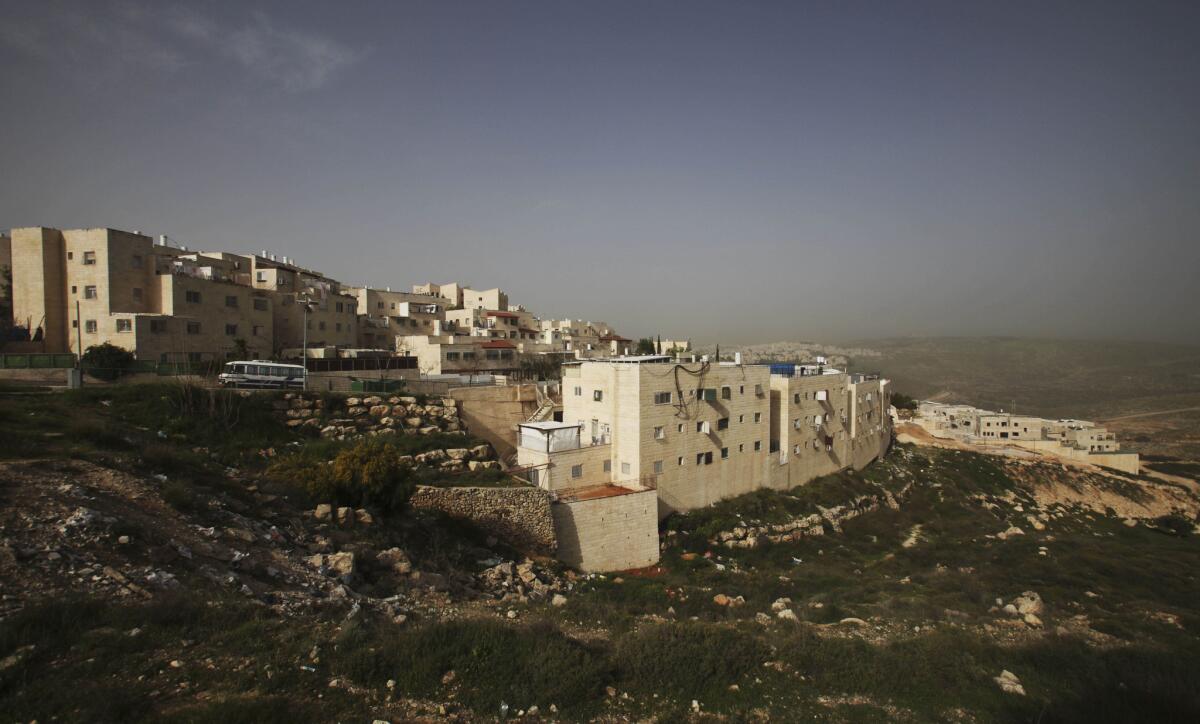Angry over new Palestinian government, Israel to expand settlements

- Share via
Reporting from Jerusalem — In an almost predictable response to recent developments, Israel announced plans to expand construction in East Jerusalem and in Jewish settlements in the West Bank, drawing Palestinian outrage and deepening tensions with the United States.
The announcement Thursday followed the creation of a new Palestinian unity government established in agreement with Hamas, which Israel and the U.S. regard as a terrorist organization.
The Israelis are furious about not only the new government but also its acceptance by the U.S. The settlement construction, announced Wednesday night, was widely seen as a jab at both the Palestinians and the Americans.
Israel’s Ministry of Construction and Housing approved construction in several West Bank settlements including Efrat, Ariel and Beitar Ilit as well as in Ramat Shlomo, a Jerusalem development near Palestinian neighborhoods on land captured by Israel in 1967.
The planned construction totals 1,500 housing units.
The government’s announcement came as the Jewish holiday of Shavuot drew to an end -- unusual timing that underscored Israel’s strong feelings following the swearing-in of the new Palestinian government.
Israel rejects the new government in Ramallah, regarding it as backed by Hamas, although members are formally political independents and technocrats. It will govern Palestinian affairs in both the West Bank and the Gaza Strip.
Hamas has governed Gaza since violently splitting with the Palestinian Authority in 2007.
Israeli officials have not hidden Prime Minister Benjamin Netanyahu’s deep dismay over the swift U.S. announcement that it would work with the new government. The State Department expressed concerns over Hamas’ role, but said it would judge the new government on the basis of “its composition, policies and actions.”
Netanyahu has said he is “deeply troubled” by the U.S. position and urged the international community and the United States in particular to “make absolutely clear” to Palestinian President Mahmoud Abbas that “his pact with Hamas, a terrorist organization that seeks Israel’s liquidation, is simply unacceptable.”
Deputy Defense Minister Tzahi Hanegbi said the message Israel had heard from Washington was that it would take a “time-out” to see where the new government was headed.
“Regrettably, reality was different. We regard this policy as a mistake and will act to change it,” Hanegbi said in a radio interview Thursday. He said Israel would focus its outreach on Congress.
After the U.S. move, governments around the world followed suit, leaving Israel alone in its position and in fierce dispute with its American ally, but with few practical means of expressing its displeasure besides the settlement construction. One columnist termed the situation a “diplomatic meltdown.”
Housing Minister Uri Ariel, a long-time stalwart of the settlement movement, told Israeli media the construction plans were part of Israel’s “punitive measures” against the Palestinians and an “appropriate Zionist response to the formation of the Palestinian terrorist government.”
Settlement leaders who recently complained to Netanyahu of a de facto freeze in West Bank construction welcomed Thursday’s announcement.
Opposition lawmakers slammed the move as irresponsible and damaging.
Isaac Herzog, head of the opposition, said the construction announcement was “poking Barack Obama in the eye with an act of diplomatic pyromania.” Another legislator, Nahman Shai, said the government is “refusing the accept the new reality” and leaving the country’s fate in the hands of an extremist minority.
Palestinian officials reacted harshly. “Palestinian leadership will response in an unprecedented way to this step,” said Nabil Abu Rudeinah, a spokesman for Abbas. He said the settlements are “illegal and unacceptable and there will be no peace with settlements.”
The Palestine Liberation Organization’s executive committee described the move as an escalation taken by Israel when the new government has “been universally welcomed” by everyone else. The committee plans to address the United Nations Security Council and General Assembly to ensure Israeli accountability, said an emailed statement from committee member Hanan Ashrawi.
U.S. Ambassador to Israel Dan Shapiro spent much of Thursday morning explaining the American position on the new Palestinian government in a series of interviews to Israeli media.
Shapiro stressed the U.S. sees eye to eye with Israel on Hamas and will not work with the organization it if it does not accept international demands for nonviolence and recognition of Israel and past agreements.
“We have no illusions regarding Hamas, which is a terror organization committed to Israel’s destruction,” Shapiro said. However, he added, the U.S. has made a practical decision to work with the new government, in keeping with U.S. law and on a “day-to-day evaluation.”
Israel will not negotiate with the new government Abbas formed after political reconciliation with Hamas, but it too is working with it on a practical basis, the ambassador said. He noted that Israel transferred about $135 million in taxes collected for the Palestinian Authority the same day the new government took office, as well as declaring the security cooperation would continue.
While Israel and the U.S. are still “on the same page on all strategic issues,” the settlements are not one of them. “We oppose construction in the settlements … and this would be the case with or without the dispute surrounding the new Palestinian government,” Shapiro told Israeli radio.
Sobelman is a special correspondent. Special correspondent Maher Abukhater in Ramallah contributed to this report.
More to Read
Sign up for Essential California
The most important California stories and recommendations in your inbox every morning.
You may occasionally receive promotional content from the Los Angeles Times.










